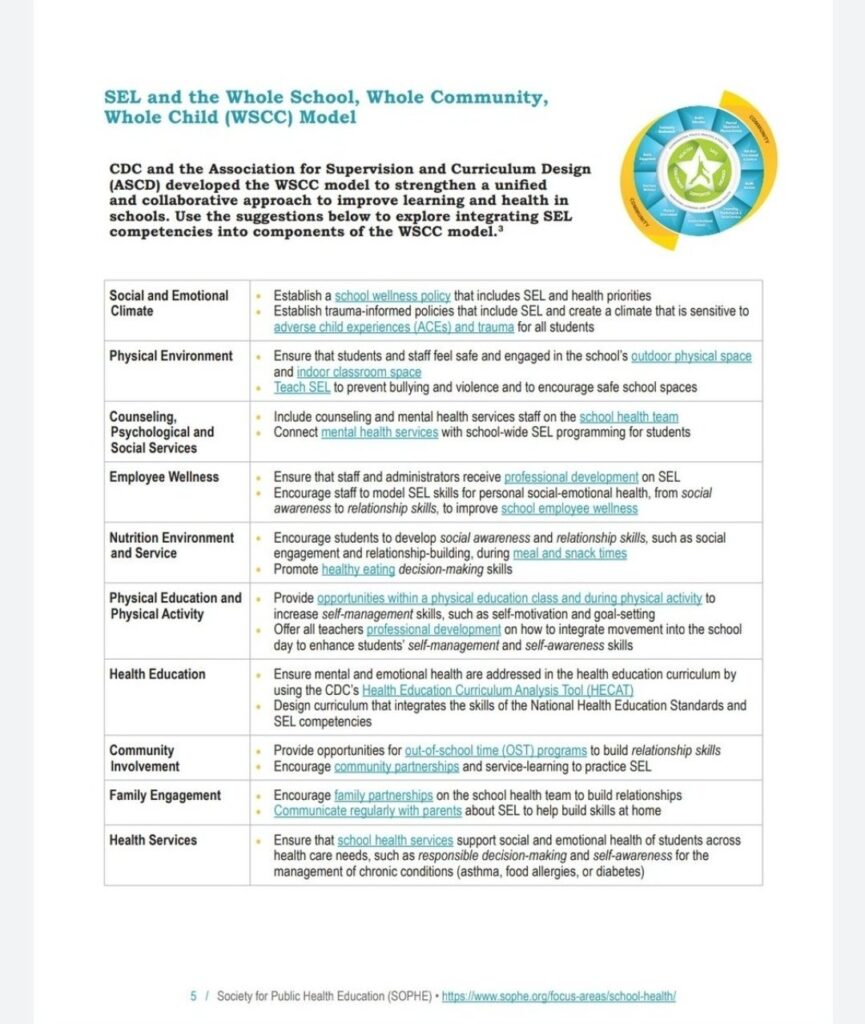Now that a couple of New Hampshire Schools have begun the process of transitioning their district into the CDC’s (Center of Disease Control) Community School Model, parents need to understand what can happen.
The CDC’s Community School is reported as:
What is the WSCC model?
The Whole School, Whole Community, Whole Child, or WSCC model, is CDC’s framework for addressing health in schools. The WSCC model is student-centered and emphasizes the role of the community in supporting the school, the connections between health and academic achievement and the importance of evidence-based school policies and practices. The WSCC model has 10 components:Physical education and physical activity.
Nutrition environment and services.
Health education.
Social and emotional climate.
Physical environment.
Health services.
Counseling, psychological and social services.
Employee wellness.
Community involvement.
Family engagement.
You have to wonder why a child would go home to their family after seeing that the school will be providing all of this.
They want to make sure children can access mental health treatment, Social and Emotional Learning, medical services, sexual and reproductive care, and dental services at school. Parental consent may be included for some of these services, but many of these people will be working to remove that.
In New Hampshire, a proposed Bill was tabled this year in the Senate spelling out parental consent for some of these services. Manchester schools are still fighting to keep lying to parents if their children change their names in school.
Democrats in New Hampshire made it clear that they want to keep parents in the dark, lie to them, and keep them from consenting to medical and mental health services.
It’s important to understand that anything that is considered “FERPA” protected means your child’s personal information can be shared without your knowledge or consent. How does that happen? FERPA has exceptions, which means there are exceptions to the student privacy law. This is how tech vendors access and share your child’s personal information without your knowledge or consent. Now that the SBHC School Based Health Clinic will maintain your child’s personal mental health and medical information, there are no real privacy protections in place. Read the contract or MOU between your school district and SBHC.
Here is the MOU between Manchester and Amoskeag Health.
Scanned Docs
Here are some concerns:
Page 3: Amoskeag is responsible for confidentiality and security of all student data, and must notify MSD immediately upon any breach of security. There is no provision for informing parents.
Page 5: Facilitate school-based psycho-education groups to promote social, emotional, and mental health . References to MTSS-B Multi-Tiered System of Support- Behavior . (We already know that schools are sharing PII Personally Identifiable Information on their students’ mental health)
Page 7: Amoskeag Health may have to access protected student information due to its legitimate educational interest. They cannot perform their services without access to this student data. NOTE: FERPA loophole. There is NO parental consent.
Page 10: Students Record and Access will comply with FERPA
NOTE: FERPA Loophole. There is NO parental consent.
Directory Information:
1 Students’ name, address, telephone number, date and place of birth, and dates of enrollment;
2 Parents’/guardians’ name and address;
3. Students’ grade level, enrollment status and dates of attendance;
4. Students’ photograph;
5. Students’ participation in recognized school activities and sports;
6. Weight and height of member sof athletic teams; and
7. Students’ diplomas, certificates, awards, and honors received.
Page 11: Disclosure of PII Directory Information
Page 12:
FERPA Exceptions. Who can access PII without parental or student consent.
School officials with a legitimate educational interest may access student records,
Transfer to another school. Officials for audit or evaluation purposes
d. Appropriate parties in connection with financial aide. Organizations conducting studies on behalf of the school district.
NOTE: No parental consent.
Page 17 Consent to Treat 12 years old or older, student can consent to Drug and/or Alcohol Abuse Treatment without the consent of a parent or guardian. 14 years or older, student can consent to services related to Contraception and STD’s without the consent of a parent or guardian.
Page 18: Authorization for Designation of Parental Consent Physical Exams (School Physicals, Well Child Checks, Camp Physicals, Sports Physicals, etc) Female Exams (Pap smears/Breast exams) Immunizations Sick Care (Acute Illnesses such as colds, flu, or other problems) Counseling Services Health Education Follow-up care for ongoing conditions (for example asthma, weight problems, acne, diabetes, and medical problems)
Social-emotional learning is designed to be combined with health and leads to the CDC Association for Supervision & Curriculum Design’s (ASCD) Whole School, Whole Community, Whole Child (WSCC) Community Healthy Schools model.
In schools that have the toughest time teaching children to read, they will now begin the difficult task of treating their medical and mental health.
Some of the services require parental consent, but there will be a constant struggle to remove parental consent in the future. Elected Representatives and school officials have made it clear that they are hostile to parental rights in New Hampshire.


